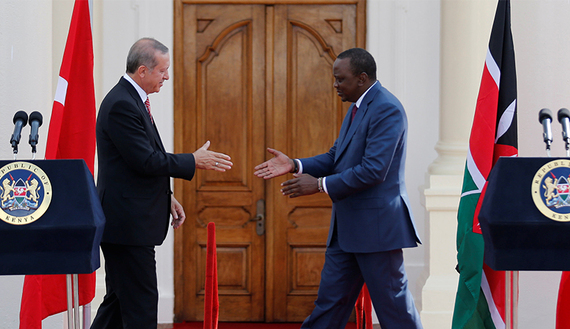Alwaght- Turkish President Recep Tayyip Erdogan is clearly working on strategy to expand his country’s influence across Africa, as part of his bid to emerge as a major global player.
Over the past six months Erdogan has visited eight African countries. In February, Erdogan traveled to Senegal and later in March he went to the Ivory Coast, Ghana, Nigeria, and Guinea
Last week the ambitious Turkish president visited three Eastern Africa countries -- Uganda, Kenya and Somalia. His Foreign Minister Mevlut Cavusoglu was in Rwanda before joining Erdogan for the four-day visit.
Economic, Political Ties
Turkey’s interest in Africa dates back to 1998 when it launched what it called an open-up policy toward the continent, but things actually turned serious when Turkey adopted in 2003 a strategy to develop economic and trade ties with the continent.
Turkey then declared the year 2005 as the Africa Year in the country, which was followed by the organization of the first Turkey-Africa Cooperation summit in Istanbul in 2008. The second cooperation summit was held in Equatorial Guinea in 2014.
In 2008, Turkey became a strategic partner to the African Union which comprises all the 54 countries of the continent.
Turkey has been a member of the African Development Bank since January 2013, a status which relatively raises Turkish companies’ chances to take part in public tenders and infrastructure investments.
No doubt Ankara seeks to aggressively exploit Africa’s immense minerals, human resources and fertile agricultural land with its eyes also on the continent’s oil and natural gas reserves.
Turkey had embassies in only 12 African capitals in 2009. The current figure is 39 and Ankara is aiming to open missions in all the 54 countries in the continent.
During his visit to Somalia, Erdogan opened Turkish sponsored projects and the largest Turkish embassy in the world. This was the third visit by Erdogan to Mogadishu since August 2011.
Meanwhile the number of resident African embassies in Turkey, which was as low as 10 some five years ago, has also increased to 32.
Turkish Airlines, Turkey’s national flag carrier, is the foreign company flying to the highest number of destinations in Africa. It currently flies to 48 destinations in 32 countries in the continent.
Military ambitions
In a display of Ankara’s ambitions to become a global power, a Turkish naval task force composed of four warships and three helicopters toured around Africa in 2014.
During the 102-day campaign, the warships made port calls in 27 countries.
During his stay in Mogadishu Erdogan signed an agreement to build a military base which will train Somali national army units. Based on an agreement between the Turkish and Somali governments, over 1,500 Somali troops will be trained by 200 Turkish military officers at the base, being established in Somalia’s capital Mogadishu.
Emil Tekin, an official from the Turkish Foreign Ministry was quoted in January this year as saying that the “military training center will also be an important base to provide military training to all of Africa.”
In Erdogan’s visit to African countries, several security or military agreements were signed with Turkey expected to supply military hardware and training to African militaries and security agencies.
Soft power
Turkey is also making inroad in Africa by projects its soft power in the fields of culture, education, media, religion and humanitarian assistance.
Turkey has been trying to win over hearts in Africa through aid and services provided by various humanitarian organizations including the Turkish Cooperation and Coordination Agency (TIKA), Turkish Red Crescent and the country’s Islamic charity NGO Humanitarian Relief Foundation (IHH)
TIKA has offices in 14 countries and is providing aid and services in 28 countries in Africa. IHH says it has built has built around 6,000 water wells in Africa so far.
Education is another front of Turkey’s Africa initiative, around 4,500 students from Africa are currently receiving education in Turkey through scholarships provided by the Turkish government. In Turkey, the total number of university students from Africa is 12,057, while 135 African professors currently teach in Turkish universities.
Another aspect of Erdogan’s visit was the government’s battle against the Gulen Movement and its leader, Fetullah Gulen. The movement has a strong presence with high-quality schools in the least developed and developing Muslim-majority countries of Africa and Central Asia.
Spanning more than 160 countries around the world, the self-exiled Muslim cleric’s schools had been promoted by the Turkish government’s initiative until hostilities between the Ankara regime and the movement came to the fore.
In the media sector, Turkish Radio and Television (TRT) last February announced a major plan to expand to sub-Saharan African media by establishment of an African channel to be called TRT Africa. TRT World Service Radio is already broadcasting in 41 languages, including two major African languages, namely Swahili, a very popular language spoken in East and Central Africa and Hausa spoken widely among Muslim communities in West Africa particularly in Africa’s most populous country, Nigeria and Niger.
The Turkish daily Hurriyet recently admitted that Ankara aims to compensate the loss of its West Asia markets by establishing a presence in Africa, and like recent Saudi regime’s inroads in the continent, to counter-balance Iran’s growing influence in Africa.



























